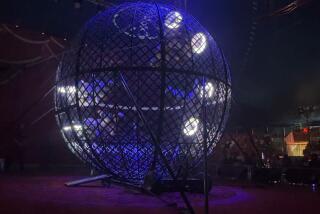Tragedy Has Spiritual Lesson for Krishna Followers
- Share via
The rhythmic chant that Daniel Farina believes is the path to a higher spiritual plane hadn’t yet dissipated when his ears picked up another sound.
Metallic, regular and unfamiliar, the sound carried across the air of the Santa Monica Farmers’ Market last week where Farina and other devotees of the Hare Krishna faith were seeking donations of surplus vegetables.
Attuned to danger by his years as a Marine, Farina, 32, turned to look, but it was already too late. A flash of maroon was all he saw before a crushing blow to his left side launched him into the air.
It was only later that Farina learned the details. His steps that day had carried him into the swath of destruction created in the center of the market by a car driven by 86-year-old George Russell Weller.
Ten people were killed and dozens injured, including Farina and another Krishna follower. The “chk--chk--chk” of Weller’s car clipping the awning poles of the market’s vending booths was very nearly the last sound Farina ever heard.
Just three weeks earlier, Farina had joined the Radha Krishna Temple in Venice. After experiencing the scale of carnage and human suffering wrought by the crash, he might seem like a prime candidate for a crisis of faith.
Instead, the crash seems only to have increased Farina’s devotion to what followers say is the oldest system of religious belief on earth. He is happy, he said during an interview at the temple, that his reflexes didn’t kick in quickly enough for him to avoid being hit.
“If they had, I would be giving the credit to my military training,” he said.
Instead, being struck by the car and surviving with nothing more than a bruised hip has convinced Farina that he was protected by the tilaka paste that Hare Krishna devotees daub on their bodies, that he was fortified by chanting God’s name in the minutes before the crash and that he was spared because of his devotion.
The crash, he is certain, had a higher purpose.
“It’s going to help me understand my rightful place in the universe,” he said.
In fact, the crash that nearly killed two of their own has served as an object lesson for all 18 members of the Radha Krishna Temple.
But it inspired no sermons at the two-story temple on Dudley Avenue, where there was no spiritual counseling, prayer meeting or, in fact, any attempt at all to explain the horrific event.
“No one sat down and said, ‘How are we going to figure this out?’ said Jaga-mohan Das, the temple president.
Instead, each of the temple’s vaishnavas, a Sanskrit term for “devotees of Vishnu,” was expected to consider the crash from a perspective in which it is said that not a blade of grass moves without the will of the Lord, and in which the physical body is sometimes compared to a prison from which the soul must escape.
In the Hare Krishna system of belief, the Hindu god Vishnu, who is also known as Krishna, Rama, Hari and Narayana, is the supreme being in a universe populated by thousands of lesser demigods.
Humanity, they believe, has an eternal bond with Vishnu, but has turned away from that spiritual relationship and become fixated on the material world, which leads to sin.
To restore their relationship with God, vaishnavas must renounce sin and perform devotional service, or bhakti, the main component of which is the maha-mantra, the “Great Chant of Deliverance.”
A prayer that calls upon Vishnu to engage a vaishnava in service, the chant is frequently and publicly recited, and to outsiders is perhaps the most familiar feature of the Hare Krishna faith:
Hare Krishna, Hare Krishna, Krishna Krishna, Hare Hare, Hare Rama, Hare Rama, Rama Rama, Hare Hare.
It is this prayer that Jaga-mohan, Farina and six other temple members were chanting at the market in the minutes before the crash, Jaga-mohan believing that they would provide a dynamic contrast to the studied silence of a group of Orthodox Jews standing nearby.
After a market employee complained about the din of their chanting and the cymbals that the devotees were using as accompaniment, Jaga-mohan said, he asked for three volunteers to ask the market’s farmers for bruised produce.
Two of those volunteers, Abirama Das, 22 and Jagadish Das, 26, have already taken names given to them by a guru, whose assistance, they believe, is required to achieve the spiritual plane. Das, the surname taken by all devotees, is Sanskrit for servant.
Jagadish had just collected a bag of vegetables, he said, when the same noise that Farina heard also caught his ear. He turned to see the crowd parting “like the running of the bulls.”
The hurtling car that nearly ripped the bag of vegetables from his hands also hit Farina and Abirama, who suffered two broken legs and a broken shoulder.
“We have slogans about not being attached to our material bodies,” Jaga-mohan said. “But when one of your friends is almost obliterated by a car you may begin to question that belief.”
Not so for Farina, who has redoubled his chanting since the crash.
He had a ready answer when asked why he thinks he was spared. “Because I haven’t met my guru yet,” he said.
More to Read
Sign up for Essential California
The most important California stories and recommendations in your inbox every morning.
You may occasionally receive promotional content from the Los Angeles Times.













